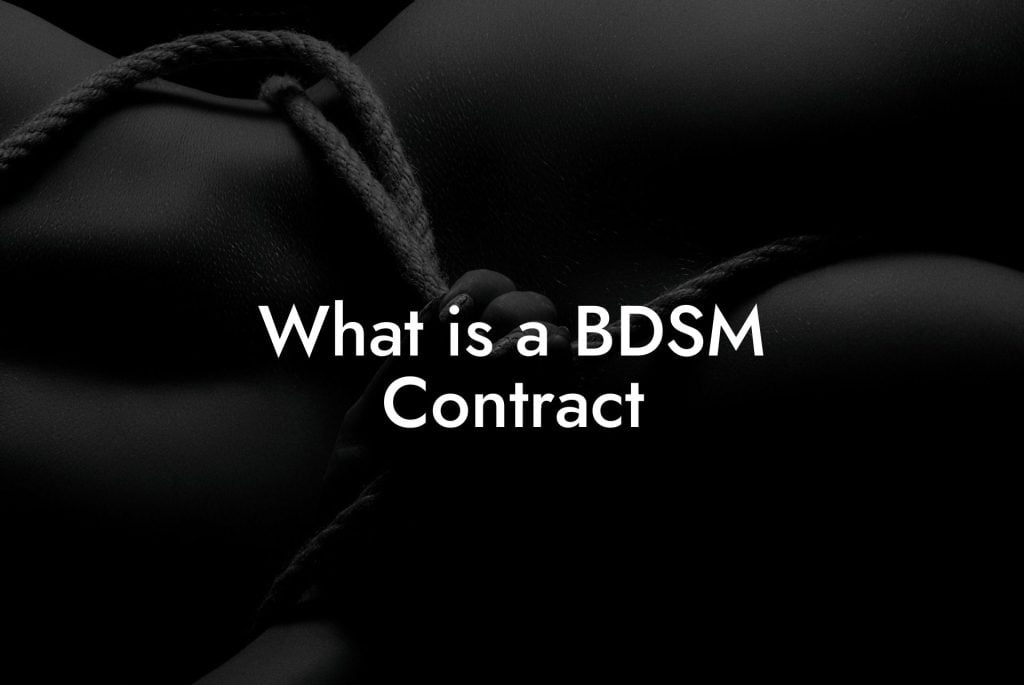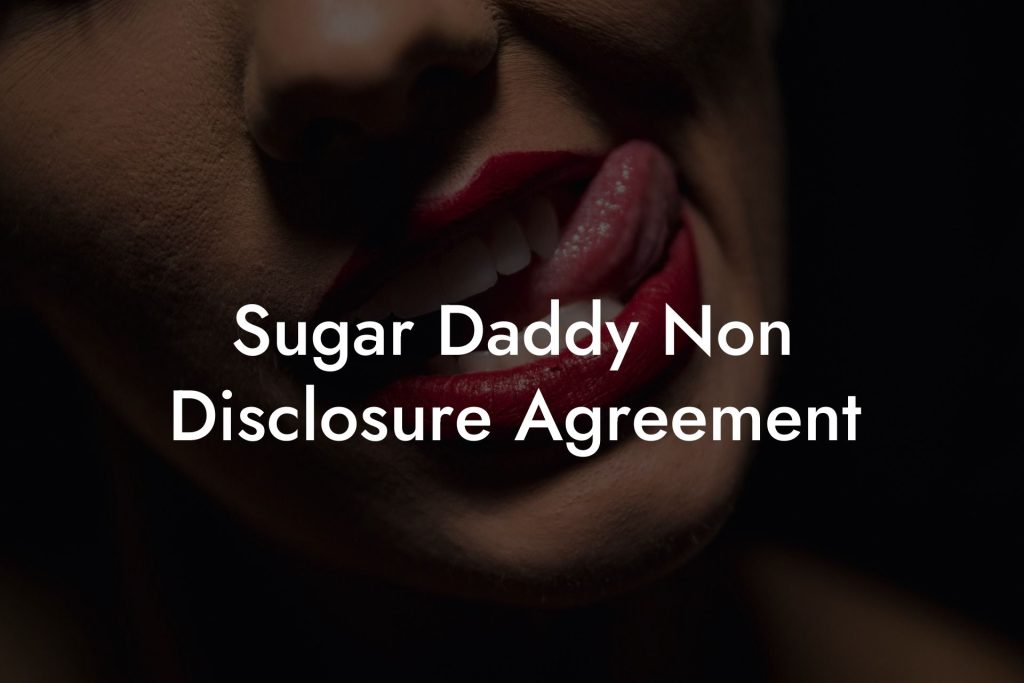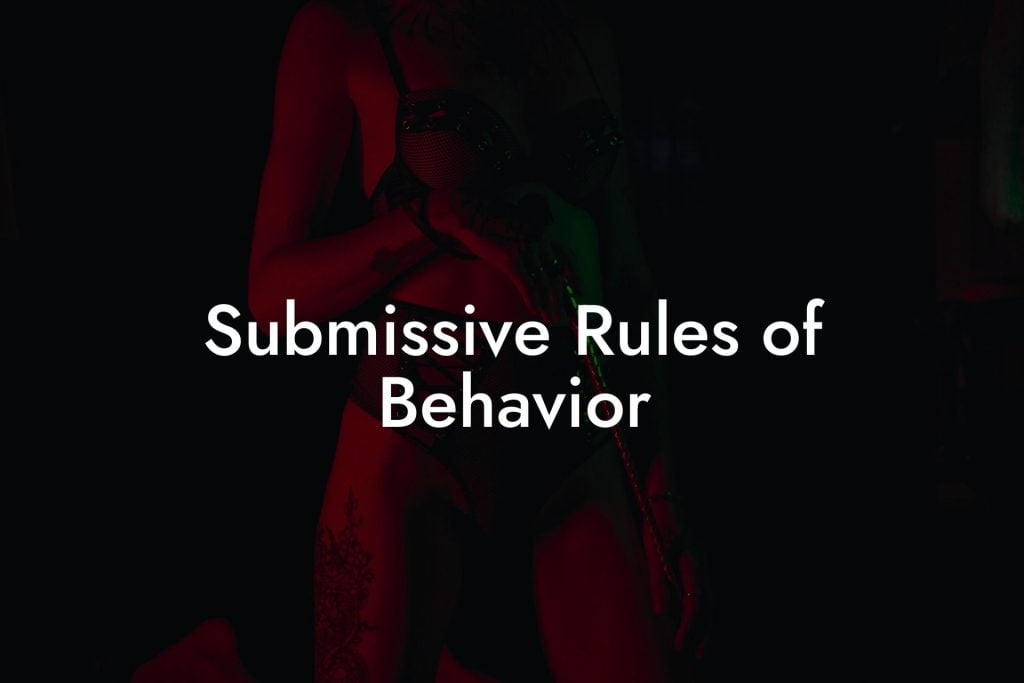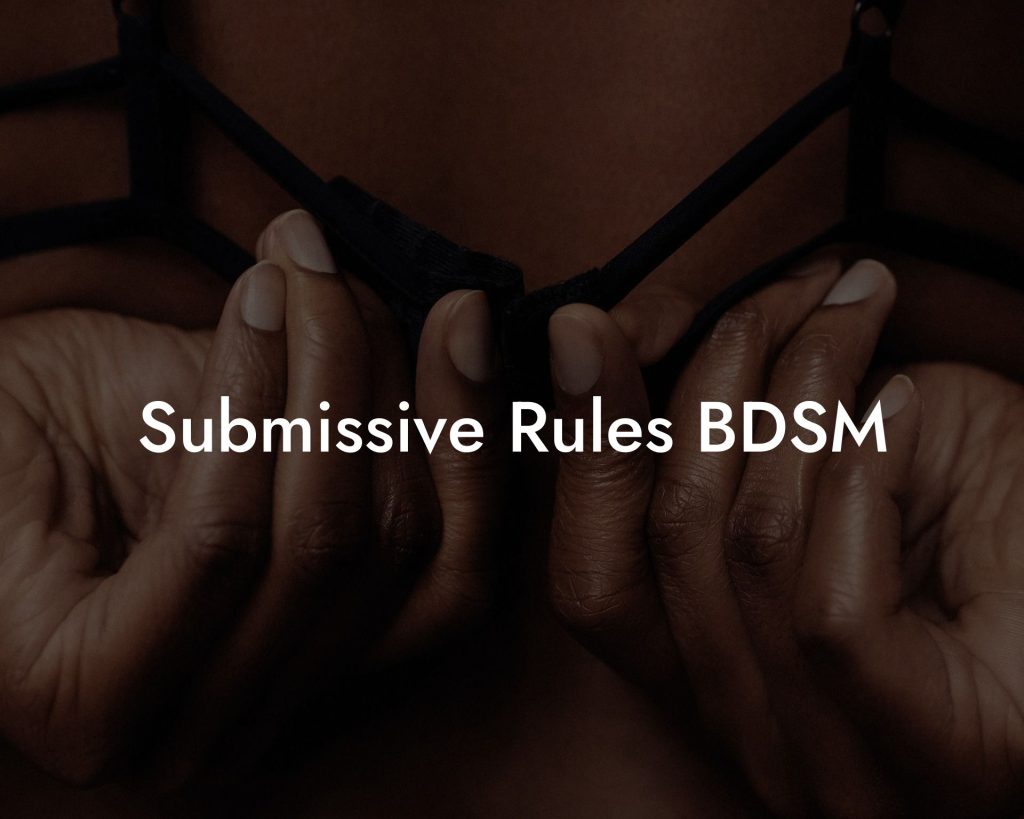BDSM, short for Bondage, Discipline, Dominance, Submission, Sadism, and Masochism, is a captivating and intimate world that has captured the attention of many individuals seeking to explore their fantasies. Within this realm, one essential aspect is the submissive rules that serve as a cornerstone for a healthy and fulfilling BDSM relationship. In this article, we delve into the fundamental principles and expectations that guide both dominants and submissives, emphasizing the crucial elements of consent, communication, and trust.
In any BDSM relationship, consent is the cornerstone of trust and respect. It’s more than just saying “yes” or “no”—it’s about openly communicating your desires, limits, and expectations. But trust doesn’t end with a conversation—it’s built through ongoing, clear agreements. That’s where our Dominant & Submissive BDSM Contract Pack comes in. Find out more →
Consent is the foundation upon which all BDSM relationships are built. The primary submissive rule revolves around obtaining consent before engaging in any activity. This ensures that all parties involved are willing participants who have explicitly agreed to the dynamics of the relationship. Establishing a clear and comprehensive discussion about boundaries, limits, and desires is of utmost importance. Honoring and respecting these boundaries not only establishes a sense of trust but also creates a safe space for exploration.
Effective communication is essential in any relationship, and BDSM is no exception. Open, honest, and ongoing communication between partners allows for a deep understanding of each other's needs, desires, and concerns. Submissives must feel comfortable expressing their thoughts, concerns, and limits, as well as providing feedback and seeking clarification from their dominant. On the other hand, dominants must actively listen, validate their submissive's feelings, and adjust their approach accordingly. This continuous flow of communication creates a solid foundation for a healthy and consensual power dynamic.
Trust plays a pivotal role in a BDSM relationship. Submissives place their trust in their dominants to guide, protect, and nurture them within the established boundaries. Trust is built over time through open communication, consistent actions, and the understanding that both parties actively prioritize each other's well-being. A dominant's ability to recognize and respect their submissive's limits and boundaries further strengthens the foundation of trust. Submissives, in return, trust that their dominants will provide a safe space for exploration and respect their agreed-upon rules.
Frequently Asked Questions
What is a BDSM contract?
A BDSM contract is a written agreement between individuals participating in BDSM activities. It outlines the preferences, limits, roles, and responsibilities of each party, as well as the duration and expectations of the relationship or scene. Although not legally binding, it serves as a tool to communicate and establish consent and trust between partners.
Looking for the best BDSM & Kink OnlyFans content creators? Here is a list of of our favourites that you will love:
-
- Best BDSM & Fetish OnlyFans - Molly✨ >> Link
- Best BBW & Huge Ass OnlyFans - Naughty Hanna Zimmer 💜🎀 >> Link
- Best Sexy Gaming Nerd OnlyFans - 🎮 Gracy EstuSWEET 🎮 >> Link
- Best Fetish & Kink Messaging OnlyFans - 💫Lola La Fleur 💫 >> Link
- Best Girl Next Door OnlyFans - ☀️Lily ⛅ >> Link
- Best Tiny European OnlyFans - 💝 Ami Allison 💝 >> Link
- Best Cosplay OnlyFans - 🐱 Little Kitty Kate 👉👌 >> Link
- Best Little OnlyFans - 🧸 Katya 🙇♀️ Sun >> Link
- Best Sub OnlyFans - 🍌Hanna Banana🍌 >> Link
- Best Teen & Huge Tits OnlyFans - ❣️Anny❣️19 y.o. BUSTY student girl >> Link
- Best Tiny Tits OnlyFans - ⍣⭐️ Sofia Parker ⭐️⍣ >> Link
- Best Sub & Huge Boobs OnlyFans - Nika Huge Boobs >> Link
- Best Kink OnlyFans - Sofia💖 >> Link
- Best Fetish & Girl Next Door OnlyFans - Hillary is Wet 💦 >> Link
- Best Dirty Latina OnlyFans - Paula Flores 😈 >> Link
Not quite what you are looking for? View the full list →
Why are BDSM contracts important?
BDSM contracts are important because they create a framework for safe, consensual play. They encourage open communication, clarify expectations, and help to prevent misunderstandings or harm by specifying boundaries and safe words. Contracts are a cornerstone in establishing trust between participants.
How do power dynamics work in a BDSM relationship?
In BDSM, power dynamics refer to the consensual exchange of power where one person (the Dominant) takes a controlling role, and the other (the submissive) agrees to obey and serve. These dynamics can be fluid and negotiated, and they exist only within the context of the BDSM activities as consented by both parties.
What is informed consent in BDSM?
Informed consent in BDSM means that all parties involved fully understand and agree to the activities that will take place. This includes being aware of potential risks, limitations, safe words, and having the competence and freedom to consent without coercion or intoxication.
How can I ensure I am practicing BDSM safely?
To practice BDSM safely, you should follow the principles of SSC (Safe, Sane, and Consensual) or RACK (Risk Aware Consensual Kink). Always negotiate consent beforehand, use safe words, respect boundaries, be educated about the activities you are engaging in, and have safety measures in place.
Why is trust important in BDSM?
Trust is the foundation of any BDSM interaction. It allows participants to be vulnerable and take risks knowing that their partner will respect their limits, care for their well-being, and stop at any indication of distress or use of a safe word.
How often should we renegotiate our BDSM contract?
BDSM contracts should be reviewed and renegotiated as needed. This typically occurs when there's a desire to change the terms, introduce new activities, or if there's been a significant lapse in time. Regular check-ins ensure that the contract remains relevant and consensual for all parties.
Do all BDSM relationships have contracts?
No, not all BDSM relationships have explicit contracts; they are a tool used by some but are not required. Communication about consent, limits, and desires is crucial, whether it is verbal or written. Contracts can add a level of formality and detail that some practitioners find helpful.
What should be included in a BDSM contract?
A BDSM contract should include details about limits (hard and soft), safe words, health conditions that may affect play, privacy expectations, the duration of the contract, specific roles and responsibilities, and protocols for addressing problems or terminating the contract.
What are safe words, and why are they necessary?
Safe words are pre-negotiated words or signals that participants in a BDSM scenario use to communicate that they need to slow down, check in, or stop the activity immediately. They are necessary to ensure consensual play and safety for all involved.
Are BDSM contracts legally enforceable?
BDSM contracts are not legally binding documents and are not enforceable in a court of law. They are symbolic agreements that are about setting mutual expectations and a shared understanding of consent and boundaries within the BDSM dynamic.
How should I introduce the idea of a BDSM contract to my partner?
Introduce the concept of a BDSM contract to your partner by communicating honestly about your desires and the reasons you believe a contract could benefit your relationship. Emphasize its role in enhancing trust and clarifying consent, and discuss the contract as a collaborative project that both partners contribute to and agree upon.
Can you still have spontaneous BDSM play with a contract in place?
Yes, spontaneous play can still occur within the boundaries established by the contract. A well-negotiated contract can include provisions for spontaneous acts while maintaining consent and adhering to predetermined limits.
Is a BDSM contract always written, or can it be verbal?
A BDSM contract can be written or verbal, though written contracts are beneficial for providing a clear and tangible record of what has been agreed upon. Verbal agreements rely on the memory and interpretation of those involved, which can be more ambiguous.
Can a BDSM contract cover just a single scene or interaction?
Yes, a BDSM contract can be tailored to a single scene or interaction. These are often referred to as 'scene contracts' and are limited to the specific encounter, focusing on the activities, limits, and roles relevant to that particular scene.
What happens if someone breaks a stipulation in a BDSM contract?
Breaking a stipulation in a BDSM contract is a serious breach of trust. It should be addressed with open communication, and consequences as outlined in the contract should be enacted, which may involve modifying the contract or terminating the BDSM dynamic.
How does negotiation in BDSM differ from that in other types of relationships?
Negotiation in BDSM is often more explicit and detailed due to the nature of the activities involved. It encompasses discussing and agreeing on specific practices, safety measures, emotional boundaries, and aftercare, which may not typically be as rigorously negotiated in other relationships.
What is aftercare, and why is it important in BDSM?
Aftercare is the practice of attending to one another's emotional and physical needs after a BDSM scene. It is crucial for re-establishing connection and equilibrium, mitigating potential negative feelings, and promoting a caring and supportive dynamic between participants.
Can a BDSM contract stipulate activities outside of sexual encounters?
Yes, a BDSM contract can include activities that extend beyond the sexual aspect, such as specific behaviors, protocols, or relationship dynamics in everyday life. The extent of this is wholly based on the preferences and consent of the parties involved.
What if my partner and I disagree on terms while creating a BDSM contract?
If you and your partner disagree on terms while drafting a BDSM contract, it's an opportunity to communicate and negotiate. You should never agree to something you're not comfortable with, and compromise should be reached with the welfare of both parties in mind.
Is it necessary to have a BDSM contract for a casual play partnership?
While not necessary, a BDSM contract can be beneficial even in a casual play partnership by clearly setting expectations, limits, and the nature of the relationship. It serves as a communication tool to enhance safety and consent for any level of involvement.
As you delve further into the fascinating world of BDSM and explore the dynamic power exchange between dominants and submissives, remember the essential submissive rules. Consent, communication, and trust lay the groundwork for a fulfilling and consensual BDSM relationship. If you're interested in further guidance, consider ordering our Ultimate BDSM Contract Pack, which provides a comprehensive set of agreements tailored for those embarking on their BDSM journey. We invite you to explore Filthy Adult, where you can find a wealth of information, guides, and enticing products in our fetish shop. Don't forget to share this article and inspire others to embrace their desires and explore the endless possibilities of BDSM.













